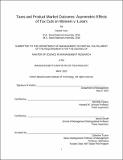| dc.contributor.advisor | Hanlon, Michelle | |
| dc.contributor.advisor | Shroff, Nemit | |
| dc.contributor.author | Yoon, Rachel(Rachel Seou) | |
| dc.date.accessioned | 2022-08-29T15:58:41Z | |
| dc.date.available | 2022-08-29T15:58:41Z | |
| dc.date.issued | 2022-05 | |
| dc.date.submitted | 2022-06-09T14:33:35.922Z | |
| dc.identifier.uri | https://hdl.handle.net/1721.1/144598 | |
| dc.description.abstract | This paper examines whether the differential effect of taxes on profitable versus loss-making firms affects their product prices and market share. Using data that allow for direct pricing and product tests - airline route and pricing data - I find evidence consistent with differential consequences of tax rate cuts for profitable versus loss firms. Specifically, after a tax rate cut, profitable airlines lower prices and enter markets where their dominant competitors include a financially constrained tax-loss airline. In addition, the data reveal that tax-loss airlines lose market share and exit routes after the tax rate cut. The results are economically meaningful - I find that airlines in a tax-loss position lose 3.3 percentage points in market share following a significant cut in corporate tax rates in routes where loss-making airlines collectively have higher market share. The evidence is consistent with tax rule changes affecting product markets and product market competition, and the effects vary based on tax status of the competitors. | |
| dc.publisher | Massachusetts Institute of Technology | |
| dc.rights | In Copyright - Educational Use Permitted | |
| dc.rights | Copyright MIT | |
| dc.rights.uri | http://rightsstatements.org/page/InC-EDU/1.0/ | |
| dc.title | Taxes and Product Market Outcomes: Asymmetric Effects of Tax Cuts on Winners v. Losers | |
| dc.type | Thesis | |
| dc.description.degree | S.M. | |
| dc.contributor.department | Sloan School of Management | |
| mit.thesis.degree | Master | |
| thesis.degree.name | Master of Science in Management Research | |
